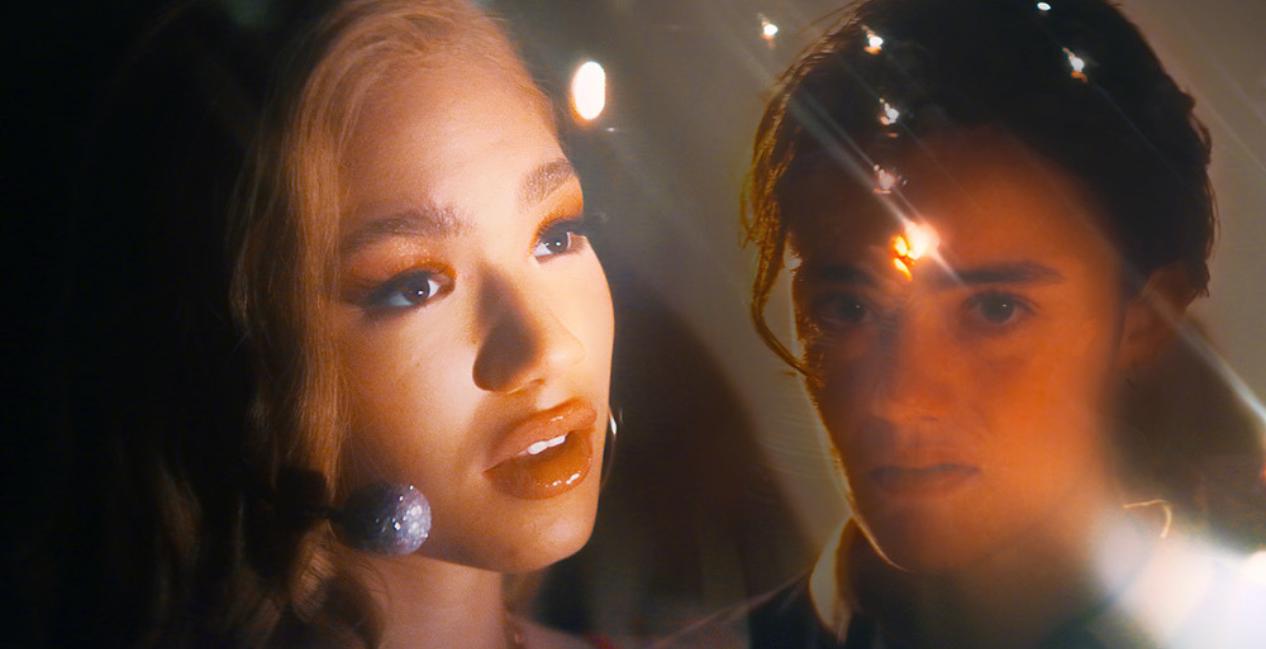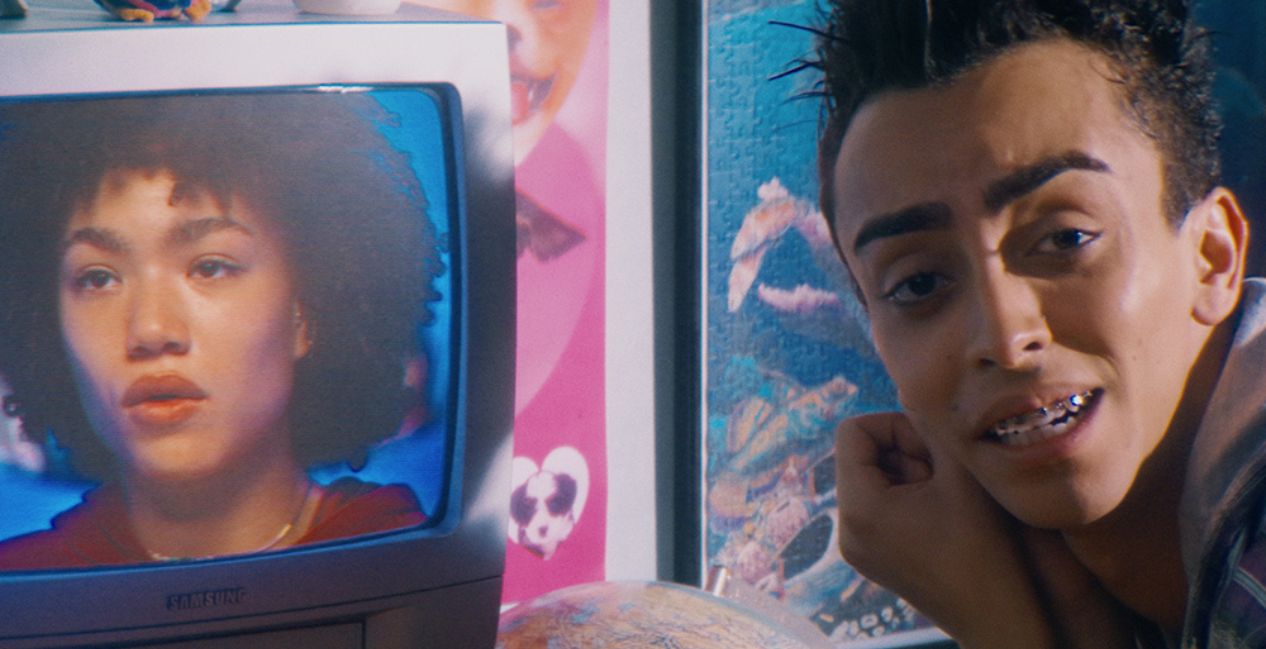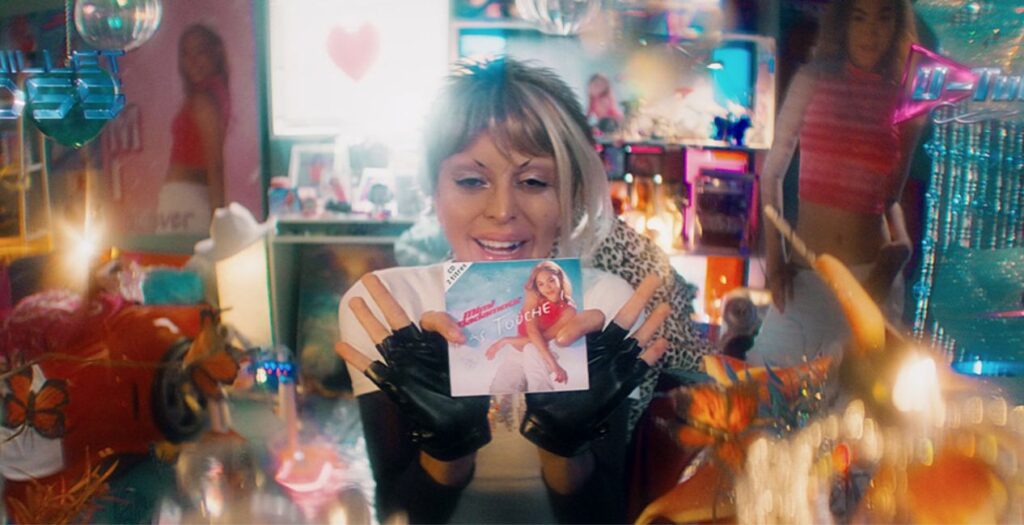Alexis Langlois’ feature film debut, Queens of Drama, could easily become a queer cult classic: a melodramatic musical with a glorious glittery baroque 2000s aesthetic about the impossible romance between a pop diva (Louiza Aura) and a punk icon (Gio Ventura), all recounted by a toxic YouTuber (Bilal Hassani).
This campy queer musical features drag, sex, obsessed stans, a song called “Fisting to the Heart,” brilliant performances, and many pop culture references. If you grew up during the 2000s and followed Britney Spears’ career, you will deeply connect with Queens of Drama, a movie that is messy in all the right ways.
Queens of Drama, which had its world premiere at Cannes 2024 and opens in the US on April 18, is both a celebration of forgotten divas who paved the way for many queer artists, as well as an over-the-top exploration of stan culture and the pressure that is put on the shoulders of celebrities to perform to certain standards set by society. All of this is accompanied by a romantic vibe that always feels genuine, as well as a fun variety of catchy songs written by artists such as Yelle, Rebeka Warrior, Mona Soyoc, and Desprats.
To find out more about Queens of Drama, check out our conversation with director Alexis Langlois, where they tell us about the musical genre, the film’s references, the highly catchy ‘Pas touche!’ song, among other topics.
This interview has been edited for length and clarity.
BUT WHY THO: What’s special about the musical genre for you?
ALEXIS LANGLOIS: For me, it may be a bit contradictory, but I really like how it goes to the heart of the characters and touches them. I like the artificial nature of the songs and how they dive into the characters’ hearts and emotions.
In the queer community very often what people see as artificial ends up being something very necessary for queer people to express themselves. And from a movie point of view, from a formal perspective, I think it allows us to explore the idea of form and to mold the movie a bit more around emotions.
There are three things I feel work together specifically in musicals more than in other genres of cinema: You can melt emotion, the political, and the cinematic form together in a way that feels cohesive, more so than other genres.

BUT WHY THO: I feel that any of us who grew up during the music video boom will connect deeply with Queens of Drama. Are there any music videos that inspired you during the writing of the movie?
ALEXIS LANGLOIS: Yeah, a lot of inspirations. Actually, a big part of the fun of making [Queens of Drama] was matching all those references, going from classic musicals like A Star is Born, and then adding classic Britney Spears music videos like ‘Sometimes’.
A big part was trying to create something harmonious between the traditional American musicals and something more akin to working class TV, like The Voice, American Idol, and this kind of stuff that you find everywhere, and even adding onto it the YouTube culture that was also a big part of my adolescence, so I was trying to mix and match all three of these things.
BUT WHY THO: Queens of Drama is, of course, a love story, but in the middle of this huge melodrama, these huge musical numbers, and baroque aesthetic, you can feel the emotions in a very pure manner, and that makes the movie realistic. How did you achieve this?
ALEXIS LANGLOIS: We achieved this with a lot of pain and blood. No, but seriously, it took a lot of work, a lot of rehearsals. Louiza [Aura], who plays Mimi, had never acted before. So one of the big things was that we tried to explore different options, different possibilities with the characters because these are characters that change throughout the movie, but it remains very important that we manage the actors and not overwork or hurt them.
We had to look for a whole set of methods to engage with emotions in something that we felt was sincere and almost more intense than their actual emotions. We took a lot of inspiration from different movies, different clips, and different music videos. We gathered all those references, made sense of them, and mixed them up.
“A big part of the fun of making [Queens of Drama ]was matching all those references, going from musicals like A Star is Born, then adding to it Britney Spears’ music videos like ‘Sometimes’.” – Alexis Langlois

BUT WHY THO: You already mentioned Louiza Aura. She’s amazing. How did you find her? How was working with her? Did she and the other actors sing their songs?
ALEXIS LANGLOIS: We met both Louiza and Gio [Ventura] in auditions, which was new for me because most of the cast were people that I already knew and had already worked with.
It all happened when we had like three or four Mimis left. What helped us decide who to choose was the chemistry between Gio and Louiza. A lot of people who came in either had a star aura or had vulnerability, but they struggled to have both of them and to balance them out. So what helped us make that final choice was picking those two who worked well together.
Louiza does not sing. She’s voiced by Ambriel Rapp, whom I discovered as she was doing a cover of ‘Shallow’ by Lady Gaga. So, she ended up being the voice of most of Mimi’s songs. Whereas, Geo actually sings most of his songs.
BUT WHY THO: Tell me about ‘Pas touche!’ I can’t stop singing that in my head. How was the process of writing the song and working with Yelle?
ALEXIS LANGLOIS: Yelle composed ‘Pas touche!’ for Louiza, which was very interesting because we already had those ideas, we had visions for what we wanted to do. So working with the musicians and working with this band meant that we had to work together on trying to figure out what the vision meant for how the song would be composed.
So we treated the musicians a lot like you treat the actors, a lot like you treat people that you work with, trying to figure out how you can play those emotions in the songs. It was a very interesting process.
Distributed by Altered Innocence, Queens of Drama opens at the Alamo Drafthouse Brooklyn on April 18, as well as at additional Alamo locations across the country on April 25, before expanding to North American theaters in May.







